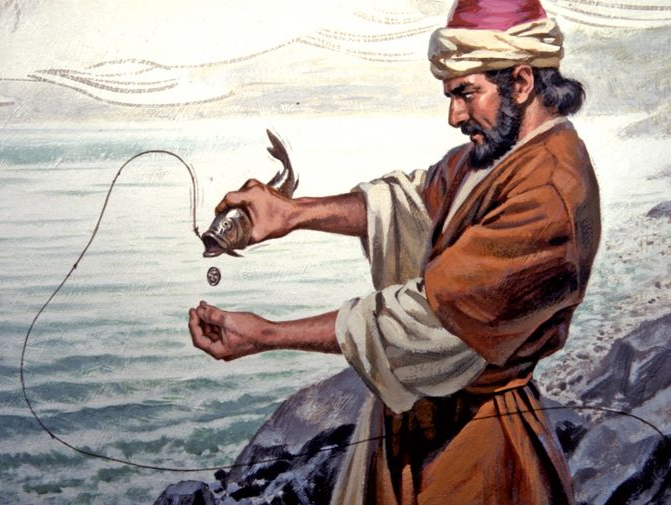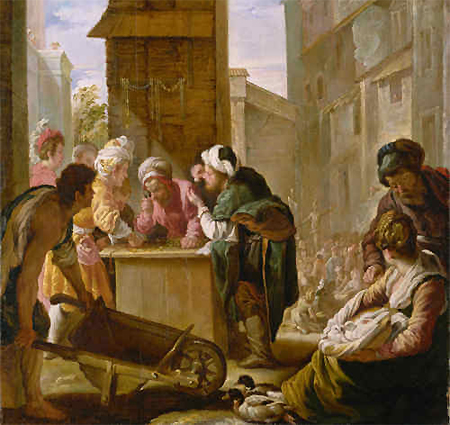Christian Art | Easter To Pentecost
John 15: 18-21 | King James Audio Bible | Daily Verses
18 If the world hate you, ye know that it hated me before it hated you.
19 If ye were of the world, the world would love his own: but because ye are not of the world, but I have chosen you out of the world, therefore the world hateth you.
20 Remember the word that I said unto you, The servant is not greater than his lord. If they have persecuted me, they will also persecute you; if they have kept my saying, they will keep yours also.
21 But all these things will they do unto you for my name’s sake, because they know not him that sent me.
Through these Bible verses, we are called upon to consider the persecution of Christians. Jesus speaks both of his own time, and of the time of the Apostles, and of time to come, including the present day.
The persecution of Christians is a live issue at present in the Middle East, through the intolerance of some people and their leaders. In living memory, we recall the oppression and murder of Christians by totalitarian regimes. As we look back through history, we find so many of our saints are martyrs.
We are additionally called to consider our Christianity in our present in our civilized world. We think of those who have lost or who reject Jesus, who mock or insult us for our faith in Jesus. We may think of those all pervasive modes of being and doing which do such harm to ourselves, to other people and to all life on earth, and which persistently threaten to occlude our relationship with God.
There is, for example, the pressure of time. There is the injunction to consume things which might not contribute to our true and spiritual well-being, which do not make us happy, and which deplete the earth’s resources and kill other species while diminishing ourselves.
We are aware of how we poison our atmosphere and pollute our land and seas and rivers, and this for what? Perhaps it is because we seem as a race to insist upon trying to live in ways which are not in accordance with Jesus, because so many of us do not know Jesus. For them we pray.
It is a question a Christian may find himself or herself compelled to consider each day. Where Jesus gave everything for our sake, where the disciples and the early Church gave everything they had and held everything in common, where we are taught by Jesus not to consider the things of this world but to fix our hearts and minds on heaven and the life eternal, how do we, as Christians, negotiate each day in this 21st Century world, such that we may live our lives wholly with Jesus?
Now, as then, it can be a hostile world. And yet, through all adversity, God is with us.
‘No one will be fit to receive the life to come unless he has prepared himself in this life to receive it.’ St Augustine
King James Audio Bible | Endnotes
We Are Not Of The World | Christian Faith And Martyrdom
As Christians, we are called to live in the world but not be of the world. This is a challenging concept that is made clear in John 15:18-21, where Jesus tells his disciples, ‘If the world hate you, ye know that it hated me before it hated you. If ye were of the world, the world would love his own: but because ye are not of the world, but I have chosen you out of the world, therefore the world hateth you. Remember the word that I said unto you, The servant is not greater than his lord. If they have persecuted me, they will also persecute you; if they have kept my saying, they will keep yours also. But all these things will they do unto you for my name’s sake, because they know not him that sent me.’
These words of Jesus remind us that as Christians, we are called to follow in Jesus’ footsteps, and this may lead us to persecution and even martyrdom. The early Christian martyrs are a testament to this truth. In the face of persecution and death, they remained steadfast in their faith, knowing that they had been chosen by Christ to bear witness to the truth.
The Church has a long tradition of honoring the martyrs. Saint Ignatius of Antioch, an early Christian martyr, wrote in his letter to the Romans: ‘I am the wheat of God, and am ground by the teeth of the wild beasts, that I may be found the pure bread of Christ.’ This idea of martyrdom as a purification is echoed by Saint Augustine, who wrote: ‘The church has always believed that the blood of martyrs is the seed of Christians.’
In the Protestant tradition, the concept of martyrdom is highly regarded. The Protestant Reformation was marked by numerous martyrs who were willing to die for their faith – at the hands of Catholics. One of the most famous Protestant martyrs was William Tyndale, who was burned at the stake for his efforts to translate the Bible into English. Tyndale’s dying words were: ‘Lord, open the King of England’s eyes.’
The idea of martyrdom is central to the teachings of many contemporary Christian leaders. Pope Francis has spoken frequently about the need for Christians to be willing to suffer for their faith. In a homily in 2013, he said, ‘We must learn the lesson of the martyrs: to live our faith with courage, to take risks, and to be prepared to pay the price for the Gospel.’
Similarly, Protestant theologian Dietrich Bonhoeffer, who was executed by the Nazis for his opposition to Hitler, wrote in his book The Cost Of Discipleship: ‘When Christ calls a man, he bids him come and die.’ Bonhoeffer believed that the call to discipleship was a call to be willing to die for one’s faith.
In John 15:26-16:4, Jesus speaks to his disciples about the coming persecution they will face. He tells them that he will send the Holy Spirit to guide them and that they will testify about him. He also warns them that they will be cast out of synagogues and that those who kill them will think they are doing God a service.
These words of Jesus remind us that persecution and martyrdom are not just historical artifacts, but a reality for many Christians today. In many parts of the world, Christians face persecution, imprisonment, and even death for their faith. As we reflect on these passages from John’s gospel, we must ask ourselves if we are truly prepared to follow Christ, even if it means facing persecution or death.
Perhaps for many of us in liberal, Western societies, the martyrdom may operate on a more ‘micro’ level, meaning that we may be vilified for Christian values, in relation to whatever the issue might be, while such pain though real can be considered if at all as a merest echo of those whose persecution is effective torture and indeed death.
Even so, it can be difficult. Perhaps we may look to the martyrs for our inspiration, while we uphold what is good in our own very small ways. May we pray to do this much.








